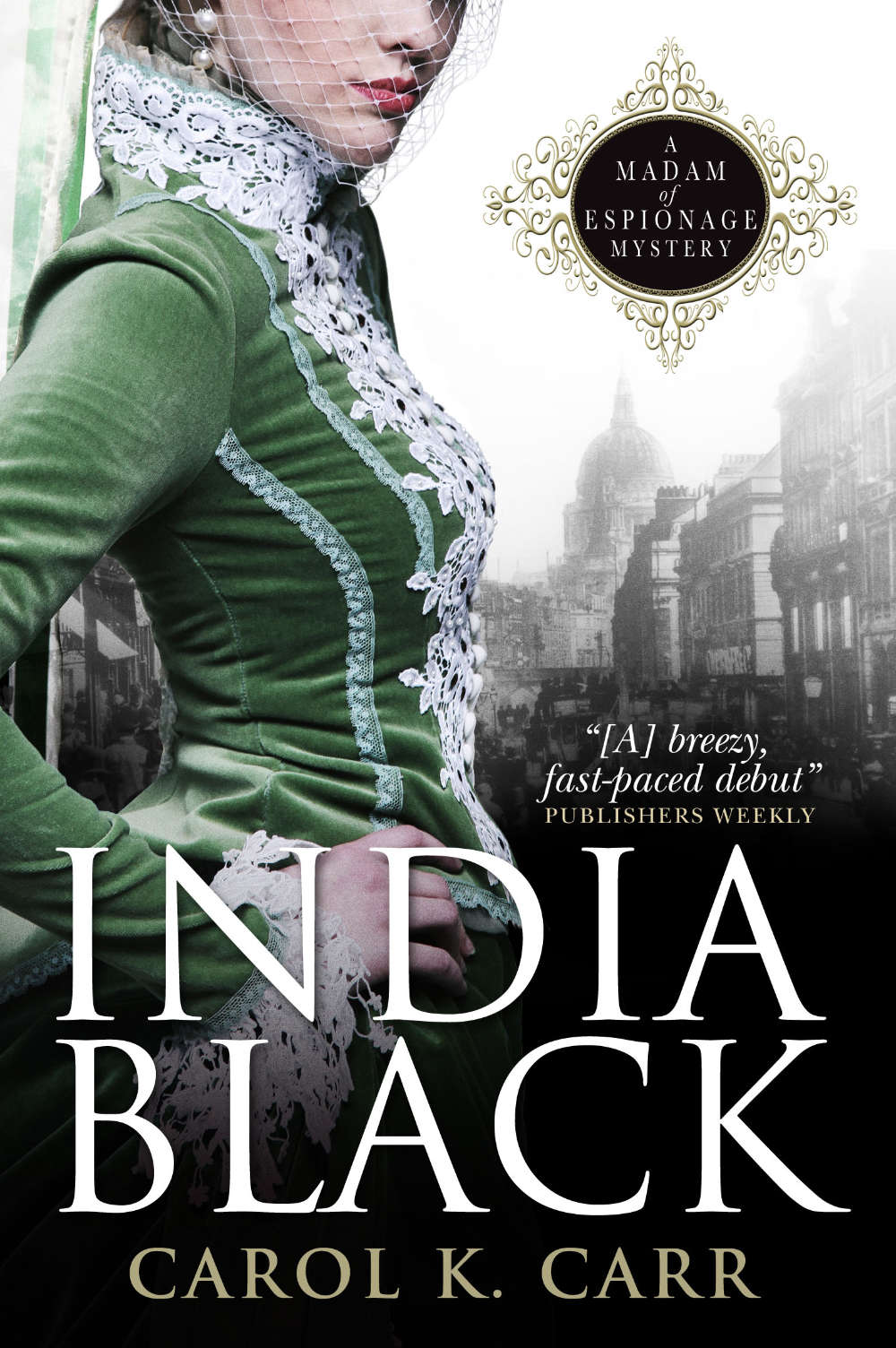The first Madam of Espionage mystery, written by Carol K Carr
Published by Titan Books
Carol Carr is a former lawyer who decided to indulge her passion for history into writing, which led to this book. You know where you are from the preface: ‘My name is India Black. I am a whore.’ It is 1876. India Black runs a brothel on St Alban’s Street in London called the Lotus House (a deliberate reference to The Lotus-Eaters poem by Tennyson, because she caters for gentlemen – it’s more like a gentlemen’s club than a house of ill repute). She used to be a whore but prefers the independence and freedom of being a madam who owns her establishment.
At this juncture in history, Queen Victoria rules the British Empire, and there is sabre-rattling from the Russians, backing the Serbs against the Ottoman Empire. Prime minister Benjamin Disraeli (or ‘Dizzy, the novelist’ as India Black refers to him) is rattling back while having to contend with former prime minister William Gladstone writing evangelical tracts against the ‘Mussulman’ Turks and supporting the nominally Christian Russians.
India Black’s life is changed when a regular client, nicknamed Bowser and who worked in the War Office, dies in the Lotus House. She enlists the aid of a reliable urchin called Vincent (a14-year-old boy who lives on the streets but knows how to get things done) to remove the body; however, a dark and mysterious man arrives, who knows all about Bowser (actually Sir Archibald Latham) and wants to help move the corpse but want’s Bowser’s case. But the case is gone, as is the ‘bint’ Arabella who was with him at the time of his death.
India Black is brusquely fetched to a meeting with the prime minister and French, the mysterious stranger, where she is told that the case had important documents in them about the number of soldiers in the British army – due to the massacres of Christians in the Ottoman Empire, European countries want to attack Constantinople and the Russians want to join in, but Disraeli fears that the Russians will take Constantinople and then move on to Egypt and block the Suez Canal to India (the country, not the heroine of our tale) and the source of the wealth of the British Empire. Disraeli can’t fight a war with the Russians but Gladstone’s troublemaking might force him to an untenable position. If the Russians get their hands on the information in the case, then they will invade Constantinople knowing that the British can do nothing about it. So India Black is coerced into getting it back – she is to accompany French to the gala ball at the Russian embassy and use her ‘feminine charms’ on Count Vladimir Maksimovich Yuspov, the head of military intelligence for Tsar Alexander II, to retrieve the case, which is currently in the possession of his most trusted agent, Major Vasily Kristoforovich Ivanov. Of course, things don’t go as planned and India Black gets involved further in escapades with French to retrieve the documents, including incidents at Claridge’s hotel, a chase to Dover and a trip across the English Channel …
The story is told as a first-person narrative (which means that any sense of real danger to the lead character is moot) and there is a nice use of a Victorian style and vocabulary (décolletage, prebenderies, glissading, ‘mandrake’ as a Victorian term for homosexual), as well as a nice sense of humour (when writing about her bints, India Black says, ‘Next they’ll be unionizing. It was becoming increasingly difficult for an employer to exploit the workers in this country. I’d have to write to my MP soon.’) and a knowing wink (there is a nod to Inspector Morse in the mystery of French’s Christian name: ‘Endeavour, perhaps?’).
However, there is an anachronistic shadow in some places that throws the reader out of the book, such as using the term ‘the dog’s bollocks’, which wasn’t invented until much later. There is the unexplained contrast between a woman who spent ‘a lifetime of fending for myself in the streets of London’ as a prostitute and the huge breadth of knowledge she displays (in addition to the Tennyson reference, there is quoting from Shakespeare and Sam Johnson, a reference to Trollope, plus the geopolitics of the era), which might be a mystery for future novels but comes across as confounding in this book. There is also a lawyer-like tendency to over-explain every aspect of the story, to reiterate why the missing documents were so important to the various people and nations, which becomes quite wearisome; this is brought into amusing contrast with the phrase, ‘I won’t bore you with the details’, used at least three times to omit some parts of the story but is exactly what the narrator has been doing throughout the book. The worst crime is the fact that the entire reason for the adventure is completely pointless – I don’t usually spoil books but I feel compelled in this instance, because our protagonists do not stop the information in the documents from getting to Russia, but it has absolutely no effect on the outcome of history at all, making the entire adventure a waste of time in my opinion. This book might be for those who enjoy a breezily paced historical adventure, but it’s not to my tastes, I’m afraid.
Disclosure: this book was provided for review purposes.




